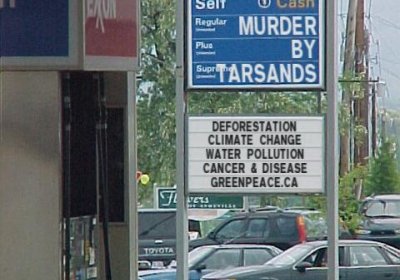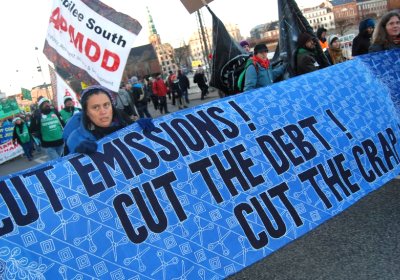In July, Socialist Alliance election candidates will be taking a trip to the Northern Territory to personally witness conditions under the federal government's intervention into Aboriginal communities.
SA youth candidates — and Resistance members — Jess Moore, Zane Alcorn and Ewan Saunders will join Indigenous activists, students, community groups and campaigners from across the country in Alice Springs for an important gathering of intervention-affected Aboriginal communities.
Environment
As climate change compels us to reduce carbon emissions, urban gardens that provide locally produced food are becoming an increasingly important model. The African Food Project is an urban, organic farm that grows traditional African vegetables for the African community around the outer western suburb of Blacktown.
On June 25, federal trade minister Simon Crean signed a deal to export up to 20 million tonnes of dried brown coal to Vietnam. The deal was signed with ironically-named Victorian company Environmental Clean Technologies (ECT). Fifty people protested outside the venue in Southbank where the deal was signed, despite the rain and only a few hours notice of the event.
Despite a promise before the last election, the Brumby state Labor government has introduced legislation to extend the urban growth boundary for Melbourne. Planning Amendment VC 67 expands Melbourne’s Urban Growth Boundary to accommodate the 284,000 houses the government expects will be needed if Melbourne’s population reaches 5 million before 2030.
About 70 people from the Green Wedge Coalition, Protectors of Public Lands and Planning Backlash protested against these plans on June 22.
In late June, two important events related to renewable energy took place.
On June 24, the Senate passed changes to the government's renewable energy target, removing the bias towards small-scale energy systems that put many wind farm projects on hold. The scheme set a 20% renewable energy target by 2020.
NASA climate scientist James Hansen has called them “factories of death”. British columnist George Monbiot has said “everything now hinges” on stopping them. US climate writer Bill McKibben is prepared to be arrested to have them shut down.
But Australian state governments don’t get it — they are still enchanted by coal-fired power stations.
Climate campaigners say Australia should urgently replace existing coal-fired power plants with renewable energy, but 12 new “death factories” are slated to be built in Australia over the next few years.
The tar sands mining project in Alberta, Canada, is possibly the largest industrial project in human history and critics claim it could also be the most destructive.
The mining procedure for extracting oil from a region referred to as the "tar sands," located north of Edmonton, releases at least three times the CO2 emissions of regular oil production procedures and will likely become North America's single largest industrial contributor to climate change.
Multinational oil companies in Nigeria spill more oil every year than has been spilled by BP in the Gulf of Mexico. Unlike the gulf disaster, most people are unaware of this ecological crime.
There have been major spills in Nigeria since BP’s Deepwater Horizon rig exploded on April 20, but they have received hardly any attention from the international media.
A May 12 explosion at a Shell installation turned 39 hectares of the Niger Delta into an oil slick, BBC News said on June 15.
Two weeks earlier, an Exxon Mobil oil pipeline ruptured. It spewed a million litres a day for a week.
On June 11 at the close of climate talks in Bonn, Germany, UN climate chief Yvo de Boer tried to put a positive spin on the outcome. “This all in all is a big step forward making much more possible in Cancun”, he said, referring to the next big climate conference that takes place in Mexico in November.
However, big step or not, the conference outcomes kept the world sprinting headlong towards a climate catastrophe.
Large mining companies enjoyed a huge profit margin of 46.1% in 2008/9, according to figures released by the Australian Bureau of Statistics (ABS) on May 28. The mining sector as a whole has a profit margin of 37.1%, making it the most profitable sector in the economy, with professional and scientific services second (24.6%) and private health care third (21.5%).
British Petroleum (BP) has admitted it may not stop the Deepwater Horizon oil spill in the Gulf of Mexico until August — at the earliest. But despite the catastrophe, the US government’s Minerals Management Service (MMS) has given BP new leases for deepwater drilling.
The MMS has rubber-stamped 198 new deepwater drilling leases in the gulf since the BP spill began on April 20. It awarded BP 13 of these.
Kiama Municipal Council will sign an open letter to the NSW government calling for no new coal-fired power stations.
Greenpeace, who initiated the letter campaign, says the NSW government plans to approve two new coal power stations in Lithgow and the Hunter Valley. If built, they would spew over 20 million tonnes of greenhouse pollution into the atmosphere each year.
Kiama Deputy Mayor, and Greens candidate for Gilmore, Ben van der Wijngaart moved the resolution, which was carried only after Mayor Sandra McCarthy, an independent, used her casting vote in favour.
- Previous page
- Page 289
- Next page






